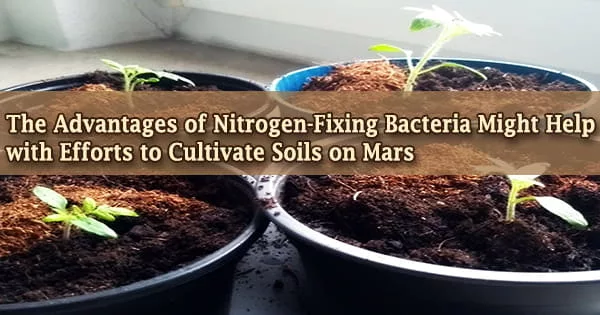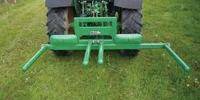When clover plants are injected with symbiotic nitrogen-fixing bacteria and cultivated on Mars-like soils, they grow substantially faster than when they are not. On September 29, 2021, Franklin Harris of Colorado State University, U.S., and colleagues will publish their findings in the open-access journal PLOS ONE.
Researchers are looking at the prospect of farming Martian soils, or “regolith,” as the Earth’s population expands. Regolith, on the other hand, is deficient in several critical plant nutrients, such as nitrogen-containing compounds, which plants require to survive. As a result, measures to enhance the quantity of these nitrogen compounds in regolith will be required for agriculture on Mars.
The components of Martian soil differ from those of Earth’s soil. In reality, with the exception of a little quantity of water, the soil on Mars is virtually exclusively made up of mineral particles. Because there are no living creatures on Mars, the soil is devoid of organic materials.
Because air is unique to Earth’s atmosphere, there is no air in Martian soil. The atmosphere of Mars contains 96 percent carbon dioxide, with trace quantities of other gases, although it is 100 times less thick than Earth’s. Because Mars’ atmosphere is so thin, atmospheric gas is scarce in the Martian soil.
This study shows that nodule forming bacteria Sinorhizobium meliloti has been shown to nodulate in Martian regolith, significantly enhancing the growth of clover (Melilotus officinalis) in a greenhouse assay. This work increases our understanding of how plant and microbe interactions will help aid efforts to terraform regolith on Mars.
Franklin Harris
Bacteria, according to Harris and colleagues, might play a cost-effective role in making Martian soils more fruitful. Bacteria in soils on Earth assist in the conversion or “fix” of atmospheric nitrogen into the molecules that plants require. Some of these bacteria live in symbiotic partnerships with plants, fixing nitrogen in nodules on plant roots.
Nitrogen-fixing bacteria are microorganisms that can convert nitrogen from the atmosphere into fixed nitrogen (inorganic compounds usable by plants). These species are responsible for more than 90% of all nitrogen fixation, and hence play a vital part in the nitrogen cycle.
The researchers cultivated clover in man-made regolith that closely matched that of Mars to investigate a possible function for symbiotic nitrogen-fixing bacteria in astroagriculture. They used the bacterium Sinorhizobium meliloti, which is often found in clover root nodules on Earth, to inoculate some of the plants. Clover can be grown in the regolith, but previous studies had not looked at inoculation with nitrogen-fixing bacteria.
The weathered volcanic rock provides the mineral stuff in Martian soil. Although it contains clay and silt-sized particles, it is mostly sandy soil. There’s also a thin covering of extremely fine dust particles on the surface. Because it contains a lot of iron oxides (rust), the soil is reddish in color. It’s comparable to Earth’s iron-rich volcanic soils.
The infected clover had 75 percent greater root and branch development than the uninoculated clover, according to the researchers. When compared to the regolith around uninoculated plants, the regolith surrounding inoculated plants exhibited no evidence of enhanced NH4, a critical nitrogen-containing molecule for plants.
Clover was used in seed mixtures because it benefited the soil and lawn’s condition. Clover was formerly a popular turfgrass partner before World War II and the introduction of pesticides. Because it helped grass flourish, it was added to seed mixtures with fescues, ryegrasses, and Kentucky bluegrass.
These findings imply that the symbiotic microorganisms increased clover growth but did not result in an excess of nitrogen molecules that might theoretically be used by other plants growing nearby. The symbiotic nitrogen-fixing bacteria infiltrate the root hairs of host plants, multiplying and stimulating the creation of root nodules, plant cell enlargements, and bacteria in close proximity. The bacteria in the nodules convert free nitrogen to ammonia, which the host plant uses for growth.
The researchers also cultivated clover in potting soil and found some variations in the symbiotic interaction between the plants grown in regolith and those grown in soil. Seeds of legumes (e.g., alfalfa, beans, clovers, peas, soybeans) are frequently inoculated with commercial cultures of appropriate Rhizobium species to ensure sufficient nodule formation and optimal development, especially in soils weak in the bacteria.
These discoveries raise the prospect that plant-nitrogen-fixing bacterium symbiosis might improve agriculture on Mars. Future study might look into similar interactions with other crops, as well as plant toxicity problems in the regolith.
The authors add: “This study shows that nodule forming bacteria Sinorhizobium meliloti has been shown to nodulate in Martian regolith, significantly enhancing the growth of clover (Melilotus officinalis) in a greenhouse assay. This work increases our understanding of how plant and microbe interactions will help aid efforts to terraform regolith on Mars.”
















